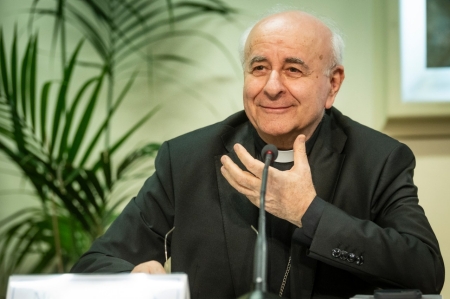Archbishop Paglia speaks about Humanae Vitae

Rome, May 19, 2023-. This morning in Rome, a two-day Congress organized by the Jérôme Lejeune International Chair of Bioethics opened on the subject “Humanae Vitae, the audacity of an Encyclical on Sexuality and Procreation”. In his introductory greeting to the assembly, Cardinal Luis Francisco Ladaria Ferrer, Prefect of the Dicastery for the Doctrine of the Faith, emphasized the importance, value, and timeliness of Humanae Vitae, commending the gathering’s planned in-depth study of the subject. As well, in a message delivered to the Congress, Cardinal Matteo Maria Zuppi, President of the Italian Bishops Conference, wrote that “We need your serious reflection on the problems created by the differences between what the Magisterium of the Church says about the creation of new life and what we see in the everyday lives of not only the wider society but of Catholics as well.”
With respect to the importance of the Encyclical today, we raised a number of questions with Archbishop Vincenzo Paglia, President of the Pontifical Academy for Life.
Your Excellency, in the past you have said that bioethics requires a reflection on all aspects of life. Today we have to deal with rescuing both our planet and humanity as a whole. Bioethics calls for a worldwide alliance among all the sciences, because the future of the planet and of humanity must be dealt with in a holistic way. In this context, looking at Church teaching, what is your assessment of Humanae Vitae, 55 years after its publication?
Let me focus on a critical element. The Encyclical gave new and crucial emphasis to the synergistic connection among sexuality, married love, and generation. This connection is found particularly in Article 9 of the document where St. Paul VI describes the four fundamental “characteristics” of married love: it is “fully human” that is, both sensual and spiritual”; it is “total” that is, a “very special form of personal friendship; it is “faithful and exclusive until death”; it is “fruitful”. Real married love resolves at a stroke the age-old uneasiness between the “ends” of marriage – the primary end, which is having and raising children (prolis generatio et educatio), and the secondary end, which is mutual support and sexual comfort (mutuum adiutorium and remedium concupiscentiae). Fruitfulness that produces new generation was conceived as intrinsic to married love, not simply a later addition. As we have wisely come to understand, we have to continue interrogating Humane Vitae for a deeper understanding of the connection that ties sexuality, married love and generation together, a connection made clearer by a personalist approach. That’s why I believe continued reflection on the subject is very important, as are wide-ranging discussions. Indeed Pope Francis, speaking about contraception, has said that “…the duty of theologians is research, theological reflection, you cannot do theology with a “no” in front of it. Then it is up to the Magisterium to say no, you've gone too far, come back, but theological development must be open, that's what theologians are for (Press conference, July 29, 2022).
What is the message and value of the encyclical?
The recognition of the unbreakable connection between married love and generation in Humanae Vitae does not mean that every marital act must necessarily bear fruit. With this affirmation, the Encyclical adopts the opening of Pius XII's famous Allocution to Midwives in 1951. It is for this reason that, proceeding from the felicitous expression found in the Vatican Council Constitution Gaudium et Spes (GS 50 and 51), St. Paul VI recognizes that procreation must be “responsible” and – as is well known – points to natural methods as the way to exercise this responsibility. After that, in the Post-Synodal Apostolic Exhortation Familiaris Consortio, St. John Paul II points out how theological reflection is called to study further both the anthropological and moral meaning of the choice of the rhythm method, beyond mere biology. “The choice of the rhythm method brings with it acceptance of a woman’s monthly cycles and thus acceptance of dialogue, reciprocal respect, shared responsibility, and self-control”. (FC 32).
In Article 14 of the Encyclical, Paul VI states that any action specifically intended to prevent procreation is not permissible. A prohibition that is considered to have created “distance” between the faithful and the Magisterium. What is your opinion about it?
I am in agreement with every provision of Humanae Vitae. You will find no one who defends life more fiercely and tenaciously than I do. I think that this Encyclical must be read today for the value it has in today’s circumstances, which concentrate on the generativity of human relationships. We are facing epochal challenges. In the Sixties the “pill” was considered a total evil. Today, we face even greater dangers. All human life is at risk if we don’t stop spiraling conflict, the arms race, if we don’t stop destroying the environment. What I would like to see is an approach that integrates Humanae Vitae with the encyclicals of Pope Francis (and St. John Paul II) and with Amoris Laetitia, and that opens up a new era of integral humanism. Integral, not just out-of-context quotes. Moreover, as Cardinal Zuppi writes in his message to the Humanae Vitae Congress, it is “…very important to avoid working within closed and homogenized circles. In the end, that kind of approach does no more than reinforce the shared views of the participants, without any trace of sincere and authentic dialogue.” This is true because – I repeat – today the challenge of continuing, protecting, developing, human life, must be faced and met everywhere, just as Laudato Si' and Fratelli Tutti teach us.
In your opinion, is there a thread that connects Humane Vitae with Amoris Laetitia? What is it?
It's family. As the paradigm for the generation of all fundamental anthropological relationships, the family is clearly the “engine of history.” It is an authentic school of life, open to society and to the world, a “laboratory” of human relations and civic responsibility. Thus, from generation to generation, the family opens the individual up to the world and teaches the way to live in it. That way is the opposite of ownership of persons and despotic domination. It is gift and responsibility, according to the model of that integral ecology that Pope Francis outlined in the Encyclical Laudato si’. It is in this optic that we can understand the firm bond between the family and the Church. Pope Francis speaks about this in Chapter III of Amoris Laetitia, where he states that “…the Church is a family of families” (AL 87) and adds: “…the Church is good for the family, and the family is good for the Church.” (87)
(Original text: Italian; translation by J. Crowley/L. Stefanucci. Published by Vatican News)



